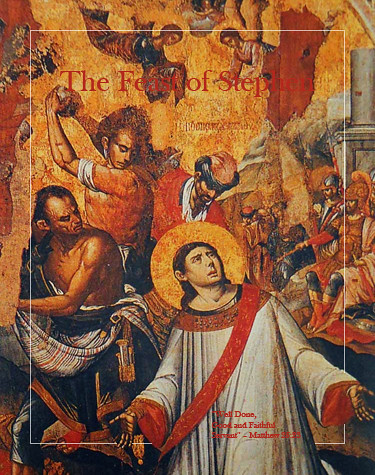
SPECIAL REPORT: “Well Done, Good and Faithful Servant”
– Matthew 25:23
Stephen's Message for Our Time
Well Done, Good and Faithful Servant” – Matthew 25:23
Today is the Feast of St. Stephen. He is remembered in the sixth and seventh chapter of the Book of Acts. The Church remembers him this day as the first Christian martyr. The man who saw Heaven opened as he was stoned to death –strengthened indeed by the promise of Heaven – was a great example of faithfulness on earth.
In chapter six of the Book of Acts, we see faithfulness in the very ordinary things of life. The early Church was not unlike the modern Church in that there were issues to be dealt with. Simple needs went unmet as the great work of proclaiming the Gospel went forth. Such was that of the neglected widows. So, Stephen and others stepped up to do the very practical work of ‘serving tables.’ It was an unsung ministry. It probably would have passed unnoticed by the recognition of Scripture but for the fact that it was indeed the training ground for Stephen’s great testimony as he stepped into the Kingdom that he held to the promise of.
In the song and story of “Good King Wenceslas,” the service of Stephen is echoed in the Bohemian King’s journey to bring a feast to a peasant man. It is a tale that reminds us that the true task of leadership is service! In fact, the role of Deacon is truly one of “ruling with Christ.” Praying people see the diaconate role of economic development as an integral part of G-d's provision. In “Resources for Deacons, Love Expressed Through Mercy Ministries,” [1.] Tim Keller states his belief in three “levels” of mercy in diaconal ministry:
The first Level Is Simple Relief: That is taking care of the immediate need.
The Second Level Is Economic Development: That is teaching the poor how to get out of poverty by teaching them how to handle money, property, etc. and furnishing them with the means to do so. “Not handouts, but ownership is the way to break the cycle of poverty.”
The Third Level Is Social Reform: Christians should be involved in the culture in an effort to change the social structure.
We see it very localized in a place like Zambia, where people of faith instruct widows to become seamstresses (and people in America gift them with sewing machines). But, can we believe God for ever greater inspiration? What vision would G-d give us for our family, our company of employment, our city and county... and beyond? George Müller said "the age of miracles is not past." Angus Buchan [7.], in the turmoil of Zambia and South Africa, looked to God for inspiration. God met him in a corn field where he learned the power of prayer!
Buchan had packed his family up during the unrest in Zambia in the late 'seventies and moved them to South Africa. A successful farmer in Zambia, he felt that he would be happy if he could acquire another farm in South Africa. It didn't. Experiencing deep depression, Buchan was angry and confused. Wandering into a lay-witness Sunday at the local Methodist Church, Angus heard builders, tradesmen and fellow farmers tell of what Jesus meant in their lives. For the first time he saw men crying, he wept unashamedly himself as he responded to an altar call. He took the Lord seriously about the changed life promise.
Buchan went back to his farm and learned to pray in his own corn field. Then he sought to minister to his Zulu workers. His farm manager, Simeon Bhengu, told him: “that's women's religion...” But God met Angus and spoke through his friendship with Simeon. Today the men are brothers in faith and brothers in every way. “My children are his and his are mine.” Angus says of his Zulu brother. Angus expanded his farming operations and G-d's miraculous provision was seen at every turn. The movie “Faith like Potatoes” is the true story of Angus Buchan and it is quite inspiring! Buchan used machinery but avoided totally mechanizing the farm, looking to provide steady employment to his Zulu neighbors.
In the early 1980's Buchan became aware of a new tragic development. AIDS was ravaging families and creating untold numbers of orphans. Buchan reached out to these orphans but had no place to house them. A local school had temporary classrooms they were going to demolish and Angus received permission to take them apart and reassemble them at Shalom, which he had named his complex at the farm. At first the children lived in dormitories but gradually Angus was able to create “houses” where one “mother” cared for a smaller number.
South Africa in her recent history has experienced much uncertainty and Buchan's experience is instructive as we look to address the turmoil in our own country today.
